- Home
- JoAnn Ross
It Happened One Week Page 2
It Happened One Week Read online
Page 2
“It’s a team effort,” Amanda reminded him mildly. “And you are a valuable member of the team.”
The copywriter, who’d won his share of awards himself, folded his arms over the front of his blue oxford-cloth shirt and said, “I categorically refuse to share blame for something as sophomoric and static as that animation sequence.”
“Sophomoric?” Julian Palmer rose to his full height of five feet five inches tall. What he lacked in stature, he more than made up for in ego. “Static? Since when are you an expert on visuals?”
“I know enough to see that if we present your idea, we’ll blow the account for sure,” Marvin retorted. “Hell, a baboon with a fistful of crayons could undoubtedly create a more visually appealing storyboard.”
Julian arched an eyebrow as he adjusted the already perfect Windsor knot in his Italian-silk tie. “This from a man who creates—” he waved the printed sheets Marvin had handed out when he’d first arrived in the presentation room like a battle flag “—mindless drivel?”
“Drivel?” Marvin was on his feet in a shot, hands folded into fists as he came around the long, polished mahogany table.
“Marvin,” Amanda protested, “please sit down. Julian didn’t mean it, did you, Julian?”
“I never say anything I don’t mean,” the artistic director replied. “But in this case, I may have been mistaken.”
“There, see?” Amanda soothed, feeling as if she were refereeing a fight between two toddlers in a kindergarten sandbox. “Julian admits he was mistaken, Marvin. Perhaps you can amend your comment about his work.”
“I was wrong to call it drivel,” Julian agreed. “That’s too kind a description for such cliché-ridden rubbish.”
“That does it!” Marvin, infamous for his quicksilver temper, was around the table like a shot. He’d grabbed hold of his team member’s chalk-gray vest and for a moment Amanda feared that the two men were actually going to come to blows, when the conference-room door opened and the client arrived with Don Patterson, the marketing manager, on his heels.
“Am I interrupting something?” the longtime client, a man in his mid-fifties whose addiction to ice cream had made him a very wealthy man, asked.
“Only a momentary creative difference of opinion,” Amanda said quickly. “Good afternoon, Mr. Carpenter. It’s nice to see you again.”
“It’s always a pleasure to see you again, Ms. Stockenberg.” The portly entrepreneur took her outstretched hand in his. His blue eyes warmed momentarily as they swept over her appreciatively. “I’m looking forward to today’s presentation,” he said as his gaze moved to the uncovered storyboard.
Wide brow furrowed, he crossed the room and began studying it for a long silent time. Since it was too late to begin the presentation as planned, the team members refrained from speaking as he took in the proposed campaign. Amanda didn’t know about the others, but she would have found it impossible to say a word, holding her breath as she was.
When Fred Carpenter finally did speak, his words were not encouraging. “You people have serviced my account for five years. I’ve dropped a bundle into your coffers. And this is as good as you can come up with? A cow wearing a beret?”
“Let me explain the animation,” Julian said quickly. Too quickly, Amanda thought with an inner sigh. He was making the fatal mistake of any presenter: appearing desperate.
“Don’t worry, the art can be rethought,” Marvin interjected as Julian picked up the laser pen to better illustrate the sequence. “Besides, it’s the words that’ll sell your new, improved, French vanilla flavor, anyway.” He paused, as if half expecting a drumroll to announce his message. “A taste of Paris in every spoonful.”
“That’s it?” the snack-food executive asked.
“Well, it’s just the beginning,” Marvin assured him. Moisture was beading up on his upper lip, his forehead. Another rule broken, Amanda thought, remembering what Patrick Connally had taught her about never letting the cli ent—or the competition—see you sweat. “See, the way I envision the concept—”
“It’s drivel,” Julian said again. “But the team can fix that, Fred. Now, if we could just get back to the art.”
“It’s not drivel,” Marvin exploded.
“Marvin,” Amanda warned softly.
“I’ve seen cleverer copy written on rolls of novelty toilet paper,” the art director sniffed.
“And I’ve seen better art scrawled on the sides of buildings down at the docks!”
Amanda turned toward the client who appeared less than amused by the escalating argument. “As you can see, Mr. Carpenter, your campaign has created a lot of in-house excitement,” she said, trying desperately to salvage the multimillion-dollar account.
“Obviously the wrong kind,” Carpenter said. “Look, I haven’t liked how all these mergers resulted in my account being put into the hands of the same agency that handles my competitors. It looks to me as if you guys have been instructed by your new bosses to soften your approach—”
“The hell we have,” both Julian and Marvin protested in unison, agreeing for once. Amanda tried telling herself she should be grateful for small favors.
“Then you’ve lost your edge,” the self-proclaimed king of ice cream decided.
“That’s really not the case, Fred,” Don Patterson, the marketing member of the team, finally interjected. A man prone to wearing loud ties and plaid sport jackets, he was nevertheless very good at his job. “Perhaps if Julian and Marvin went back to the drawing board—”
“There’s no point. We’ve had five great years working together, you fellows have helped make Sweet Indulgence the second-bestselling ice cream in the country. But, the team over at Chiat/Day assures me that they can get me to number one. So, I think I’m going to give them a try.”
He turned toward Amanda, who could literally feel the color draining from her face. “I’m sorry, Ms. Stockenberg. You’re a nice, pretty lady and I’d like to keep my account here if for no other reason than to have an excuse to keep seeing you. But business is business.”
“I understand.” With effort, Amanda managed a smile and refrained from strangling the two ego-driven creative members of the ill-suited team. “But Don does have a point. Perhaps if you’d allow us a few days to come up with another concept—”
“Sorry.” He shook his head. “But things haven’t been the same around here since all the mergers.” His round face looked as unhappy as hers. “But if you’d like,” he said, brightening somewhat, “I’ll mention you to the fellows at Chiat/Day. Perhaps there’s a spot opening up over there.”
“That’s very kind of you. But I’m quite happy where I am.”
It was what she’d been telling herself over and over again lately, Amanda thought now, as she dragged her mind from the disastrous meeting to the disaster currently being played out on the television screen.
“You know,” Susan said, “this entire challenge week isn’t really your problem. Officially, it’s Greg’s.”
“I know.” Amanda sighed and began chewing on another Tums.
Greg Parsons was her immediate supervisor and, as creative director, he was the man Ernst Janzen had handselected for the job of instituting the team concept. The man who had moved into the executive suite was as different from Patrick Connally as night from day. Rather than encouraging the cooperative atmosphere that had once thrived under the founder of C.C.C., Greg ruled the agency by intimidation and fear.
From his first day on the job, he’d set unrealistic profit targets. This focus on profits diverted attention from what had always been the agency’s forte—making clients feel they were getting superior service.
Apparently believing that internal competition was the lifeblood of success, he instigated political maneuvering among his top people, pitting one against the other as they jockeyed for key appointments.
Although such intrigue usually occurred behind the scenes, one of the more visible changes in policy was the conference table at which Amanda was
sitting. When she’d first come to work here, the room had boasted a giant round table, the better, her former boss had declared, to create the feeling of democracy. Now, five days a week, the staff sat around this oblong table while Parsons claimed the power position at the head.
Although it might not seem like such a big thing, along with all the other changes that had taken place, it was additional proof that C.C.C. had lost the family feeling that had been so comfortable and inspirational to both employees and clients.
Desperate to salvage his foundering career, Parsons had come up with theidea of taking the teams to a resort, where, utilizing a number of out ward-bound-type game-playing procedures he’d gleaned from his latest managementtraining tape, the various independent-minded individuals would meld into one forceful creative entity.
“The problem is,” Amanda said, “like it or not, my fortunes are tied to Greg.”
“Lucky him. Since without you to run interference and do all his detail work, he’d undoubtedly have been out on his Armani rear a very long time ago,” Susan said.
“That’s not very nice.”
“Granted. But it’s true.”
Amanda couldn’t argue with her assistant’s pithy analysis. From the time of Greg’s arrival from the Dallas office three months ago, she’d wondered, on more than one occasion, exactly how the man had managed to win the cor porate plum of creative director. It certainly hadn’t been on merit.
Then, six weeks after he’d moved into the expensively redecorated executive office, the question was answered when Susan returned from a long lunch with the other administrative assistants where she’d learned that Greg just happened to be married to Ernst Janzen’s granddaughter. Which, Amanda had agreed, explained everything.
It was bad enough that Greg was frightfully incompetent. Even worse was the way he saw himself as a modernday Napoleon—part dictator, part Don Juan. And although she’d deftly dealt with his less-than-subtle passes, her refusal had earned Amanda her superior’s antipathy. He rode her constantly, belittling her work even as he routinely took credit for her ideas in upper-level corporate meetings.
It was no secret that the man was unhappy in Portland. He constantly berated the entire West Coast as hopelessly provincial. It was also common knowledge that he had his eye on a superior prize—that of national creative director and vice president. Along with the requisite increase in salary and numerous perks, the coveted slot also came with a corner-window penthouse office on Manhattan’s famed Madison Avenue.
“I still don’t see why you put up with the man,” Susan said, her acid tone breaking into Amanda’s thoughts.
“It’s simple. I want his job.”
“It should have been yours in the first place.”
Once again, Amanda couldn’t argue with the truth. While she hadn’t specifically been promised the creative director’s spot when she was first hired, there’d been every indication that Patrick Connally considered her on the fast track to success.
She’d worked hard for the past four years, forgoing any social life, giving most of her time and energy to the company.
The sacrifices had paid off; there had been a time, not so long ago, when the job of creative director had looked like a lock. Until Greg Parsons arrived on the scene.
“Blood’s thicker than water. And unfortunately, Greg happens to be married to Mr. Janzen’s granddaughter.”
“Talk about sleeping your way to the top,” Susan muttered.
“Unfortunately, family ties seem to have gotten Greg this far.” Amanda frowned up at the oil portrait of the new creative director hanging on the wall. The ornate, gilt-framed painting featured Parsons in one of his dress-for-success chalk-striped suits, holding the cigar he was never without. The same cigar he took pleasure in lighting during meetings, never mind that it caused everyone there discomfort.
“But,” she continued, “after the problems he’s had instituting the team concept, he’s stalled in the water.”
Susan arched a jet eyebrow. “Are you saying you think he’s on the way out?”
“Unfortunately, I don’t think—unless Jessica Janzen Parsons wises up and divorces him—there’s any chance of that. So, I’ve come up with a plan to get the guy out of my life—and out of town—once and for all.”
“Please tell me it involves tar and feathers.”
“Not quite.” Actually, although she’d never admit it, Amanda found the idea of running Parsons out of town on a rail—like in the good old days of the Wild West—eminently appealing.
“Actually, it’s simple. Or at least it was,” she amended with another bleak glance toward the television screen. “Until the resort went up in smoke.”
“Let me guess. You were going to lure the bastard out onto the cliff behind the resort late one night, hit him in the head with his precious new PING nine iron, then shove him into the ocean. Where, with any luck, he’d be eaten by killer sharks.”
Despite all her problems, Amanda smiled. “As attractive as that scenario may be, the sharks would probably spare him because of professional courtesy. Besides, I’ve come to the conclusion that the easiest way to get Greg out of my hair is to give him what he most wants.”
“Don’t tell me that you’re going to go to bed with him?”
“Of course not.” Amanda literally shuddered at the unpalatable idea. “Actually, I’ve decided to get him promoted.”
A slow, understanding grin had Susan’s crimson lips curving. “To Manhattan.”
Amanda returned the smile with a cocky, confident grin of her own. “To Manhattan.”
Amanda couldn’t deny that losing the conference-center resort to fire was a setback. After all, without someplace to hold the corporate challenge, Greg couldn’t prove that his idea had merit. Which in turn would keep him here in Portland indefinitely.
But it wasn’t the first challenge she’d overcome in her rise up the advertising corporate ladder. Amanda doubted it would be her last.
A part of her hated the idea of Greg Parsons getting any more credit, when in reality, if the upcoming week proved a success, it would be her doing. A stronger part of her just wanted him gone. She would swallow her pride, along with her ego, if it meant getting the obnoxious man out of her life.
Now all she had to do was find some other location for the challenge. Which wasn’t going to be easy, considering this was the high tourist season on the Oregon coast.
Could she do it? Amanda asked herself as she pointed the remote toward the television and darkened the screen.
You bet.
Satan’s Cove
“We’ve got a problem.”
Dane Cutter stopped in the act of nailing down cedar shingles and glanced over the steep edge of the roof. “So why don’t you tell me something I don’t know?”
He’d been the proud owner of Smugglers’ Inn for two months. Well, if you wanted to get technical, he and the bank actually owned the century-old landmark building. Since he’d signed the final papers, Dane doubted a single day had gone by that he hadn’t had to overcome some new catastrophe.
Having paid for an extensive professional inspection of the building that, because of competition from larger, fancier resorts catering to the corporate trade, had fallen into disrepair during his time away from Satan’s Cove, Dane knew the problems he was taking on. And although they were considerable, he’d foolishly expected to have some time to do all the necessary renovations.
Thus far, he’d tackled the inn’s ancient plumbing and electrical systems, evicted countless field mice and killed more spiders than he cared to think about.
He’d also replaced the ancient gas oven, replastered the algae-filled swimming pool, and was in the process of replacing the shingles that had blown away during last night’s storm.
The next thing on his lengthy list—barring any further emergencies—was replacing the ancient gas heater, after which he planned to resand and seal the oak parquet floors in the public rooms, then resurface the tennis court
.
Since reopening last week, he’d reassured himself at least daily that it was just as well potential guests weren’t exactly beating down his door. Although he admittedly needed all the bookings he could get to make the hefty mortgage payments, he also needed time to restore the inn to its former glory.
Reva Carlson grinned up at him. “Technically it’s a bit of good news and some bad news. I suppose it’s all in how you look at it.”
“Why don’t you give me the good news first?”
The way things had been going, after the storm and the burst pipe that had left the inn without water for twenty-four hours, Dane figured he could use a little boost. Hell, what he needed was a miracle. But he was willing to settle for whatever he could get.
“Okay.” Reva’s grin widened. “It looks as if we’re going to meet this month’s mortgage payment, after all.”
“We got a booking?” If he’d had his choice, he would have kept the inn closed until all the needed repairs could be done. Unfortunately, his cash flow being what it was, he’d been forced to open for limited occupancy.
“We’ve sold out the entire place,” Reva revealed proudly.
She was right. This was definitely a case of good and bad news. “Not including the tower room?” The last he’d looked into the hexagonal-shaped room that boasted a bird’s-eye view of the Pacific Ocean, the wallpaper had been peeling off the walls.
“Of course not. You’re good, boss, but you’re not exactly a miracle worker. However, every other room, every bed, every last nook and cranny of Smugglers’ Inn is going to be taken over by some Portland ad agency for an entire week.”
Dane rapidly went over a mental list of repairs he’d have to accomplish in order to accommodate such a crowd.
“So, when are these ad people scheduled to arrive, anyway?”
“You could at least pretend to be pleased,” she complained. “Besides, it’s not that bad. We’ve plenty of time to get ready.”
“What, exactly, do you consider plenty of time?”
“Three days.”

 Magnolia Moon
Magnolia Moon Summer on Mirror Lake
Summer on Mirror Lake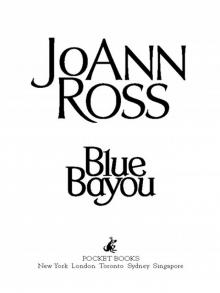 Blue Bayou
Blue Bayou Champagne and Moonlight
Champagne and Moonlight No Regrets
No Regrets Long Road Home
Long Road Home Southern Comforts
Southern Comforts Herons Landing
Herons Landing Untamed
Untamed No Regrets (Mira Romance)
No Regrets (Mira Romance) Dark Desires
Dark Desires Wanted!
Wanted! River Road
River Road Midnight Runaway
Midnight Runaway The Long Way Back
The Long Way Back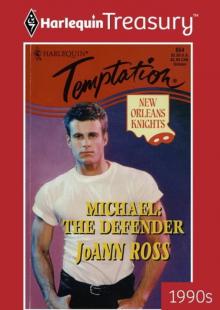 Michael: The Defender
Michael: The Defender Hot on the Trail
Hot on the Trail When I'm With You
When I'm With You Legends Lake
Legends Lake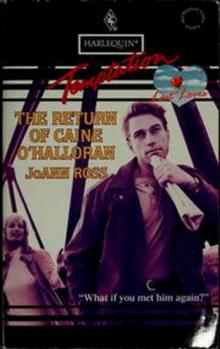 The Return of Caine O'Halloran
The Return of Caine O'Halloran Dance with a Dynasty
Dance with a Dynasty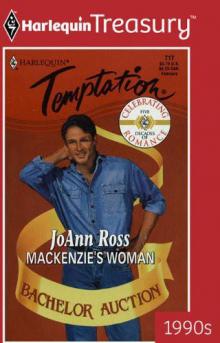 MacKenzie's Woman
MacKenzie's Woman Impulse
Impulse Sunset Point: A Shelter Bay Novel
Sunset Point: A Shelter Bay Novel You Again: A Shelter Bay novella (Shelter Bay series Book 8)
You Again: A Shelter Bay novella (Shelter Bay series Book 8) Guarded Moments
Guarded Moments No Safe Place
No Safe Place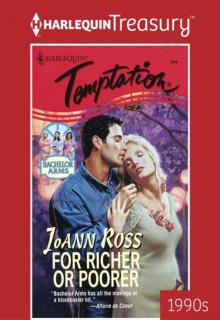 For Richer or Poorer
For Richer or Poorer Private Passions
Private Passions Once Upon a Wedding
Once Upon a Wedding Snowfall on Lighthouse Lane
Snowfall on Lighthouse Lane Christmas on Main Street
Christmas on Main Street A Place in Time (Rum Runner Island Book 1)
A Place in Time (Rum Runner Island Book 1) Leaving Blue Bayou
Leaving Blue Bayou The Return of Caine O'Halloran: Hard Choices
The Return of Caine O'Halloran: Hard Choices Lucky in Love
Lucky in Love The Prince & The Showgirl
The Prince & The Showgirl Castaway Cove
Castaway Cove A Woman's Heart
A Woman's Heart One Summer
One Summer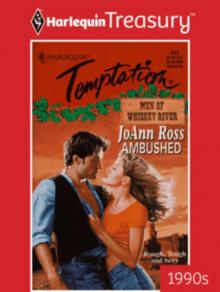 Ambushed
Ambushed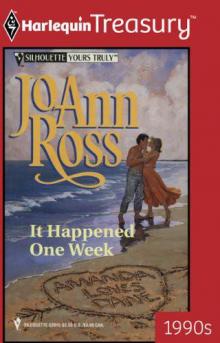 It Happened One Week
It Happened One Week Home by the Sea
Home by the Sea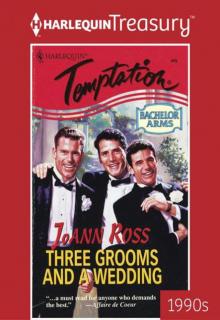 Three Grooms and a Wedding
Three Grooms and a Wedding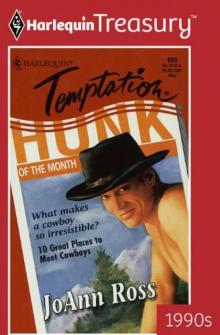 Hunk of the Month
Hunk of the Month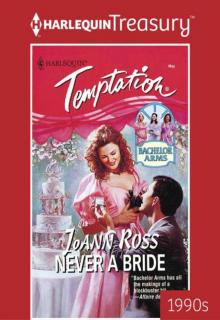 Never a Bride
Never a Bride Sun Kissed
Sun Kissed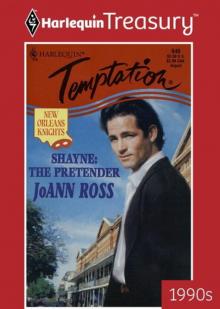 Shayne: The Pretender
Shayne: The Pretender Legacy of Lies
Legacy of Lies Far Harbor
Far Harbor Finn
Finn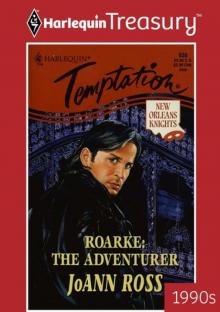 Roarke: The Adventurer
Roarke: The Adventurer I Do, I Do...For Now (Harlequin Love and Laugher)
I Do, I Do...For Now (Harlequin Love and Laugher) Briarwood Cottage
Briarwood Cottage On Lavender Lane
On Lavender Lane Sea Glass Winter
Sea Glass Winter River's Bend
River's Bend Christmas in Shelter Bay
Christmas in Shelter Bay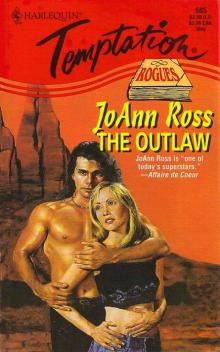 The Outlaw
The Outlaw Castaway Cove (2013)
Castaway Cove (2013) Confessions
Confessions Moonshell Beach: A Shelter Bay Novel
Moonshell Beach: A Shelter Bay Novel